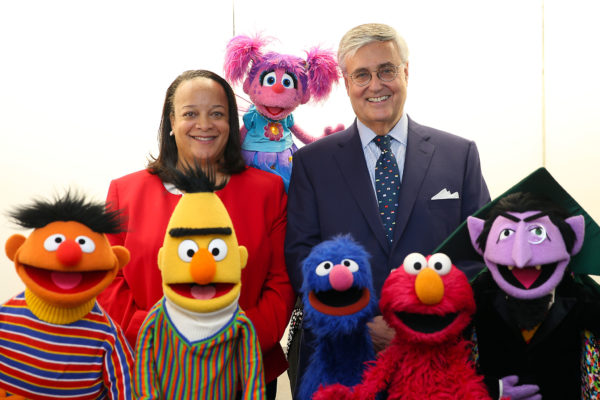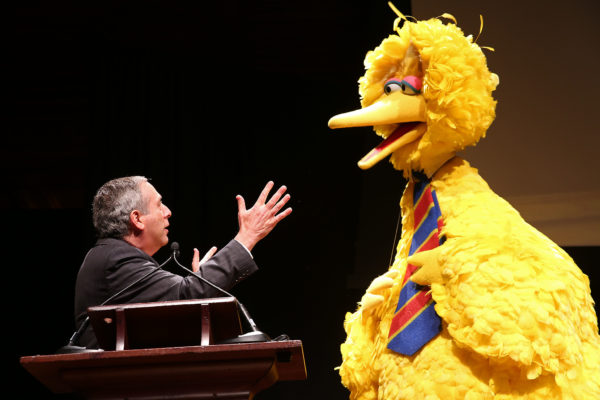Arts Feature: “Sesame Street” Comes to Harvard University to Celebrate Turning 50
By Susan Miron
The highly entertaining gala celebrated the five-decade-long partnership between TV’s Sesame Street and Harvard University.

HGSE Dean Bridget Long and Sesame Workshop CEO Jeffrey Dunn pose with Ernie, Bert, Grover, Elmo, Count von Count and Abby Cadabby from Sesame Street. Photo: Sesame Street.
Cambridge’s Sanders Theatre was jam-packed with Harvard University students on Wednesday afternoon, enthusiastically huzzahing 50 years of an extraordinary collaboration between the Harvard Graduate School of Education and TV’s Sesame Street. Some VIP Sesame people were there, and spoke, and several Harvard ensembles serenaded us, but there was no question who the stars of the gathering were: the Muppets themselves, a source of delight and laughter each time they stepped forward during the hour-and-a-half-long program. Dubbed the “Harvard /Sesame Street Celebration,” the meticulously choreographed event featured skits performed by the Muppets alongside a number of costars: Harvard University President Larry Bacow, Dean of the Graduate School of Education (GSE) Bridget Terry Long, Sesame Workshop President and CEO Jeffrey Dunn, the a cappella group The Krokodiloes, and members of The Hasty Pudding.
The gala celebrated the five-decade-long partnership between the venerable program and Harvard, led by Gerald “Gerry” Lesser, a psychologist and GSE faculty member who chaired the board of advisers for the Children Television Workshop (now the Sesame Workshop), which created Sesame Street.
Sitting in my front row seat, I was one of the few people who could see how the puppets were worked. Their puppeteers would (excluding Big Bird) slide onto the stage on low platforms on wheels. Looking at the big screen overhead, the audience saw how the Muppets would have looked on TV. For me, a longtime collector of Czech marionettes, being able to study more or less what was going on behind-the-scenes was Puppet Heaven, watching how the performances were engineered, particularly the facial expressions on the Muppet “wranglers” as they sang and talked.
Besides being a celebration of a fruitful partnership that produced one of television’s most influential shows, this afternoon fiesta offered an insider’s history of how the show evolved over the decades. From its start as an idea voiced during a casual conversation at a Cambridge dinner party (could TV be used to teach young children?), Sesame Street had deep Harvard ties. Many of its funders, as well as assisting educators and researchers, had strong connections to the university. Some of these collaborators had backgrounds in the Harvard Lampoon and Hasty Pudding Club.
Harvard University and its celebrated Ed School were bursting with pride. Furry blue Grover crowed Crimson Pride, and Bakow christened Big Bird (the day’s obvious megastar) as the official Bird of Harvard. A male sextet The Krokodiloes, clicking their fingers on the afterbeats, rocked the hall with “Can You Tell Me How to Get to Sesame Street?” Spirits soared; Big Bird wondered where his nest was located at Harvard. Bakow was charmed, suggesting that this was the best perk he’s had so far as Harvard’s president.
Sesame Street had its roots in the tumultuous 1960s, Lyndon Johnson’s War on Poverty inspiring thoughts about the need for early childhood education through the mass media. When Sesame Street made its debut, the three most watched programs on TV were Gomer Pyle, Laugh-In, and Bonanza.

President Lawrence Bacow of Harvard University declares Big Bird to be the University’s official bird at an event on October 2, 2019, celebrating 50 years of collaboration between HGSE and Sesame Workshop. Photo: Sesame Street.
The official (academic) line was “Using modeling, repetition, and humor, Sesame Street helped children with not only their cognitive skills but also their social and emotional development. And perhaps most importantly, Sesame Street insisted that quality education can be entertainment. We celebrate the love of learning, and for many, Sesame Street fueled that initial joy.” The program was also about “the power of partnership, how we can collaborate to change children’s lives.” Sesame Street, which first aired on Nov. 9, 1969, has won 193 Emmy Awards, and 3 Peabody Awards. This year the Hollywood Reporter deemed it to be “the most important program in the history of TV.”
The goal: to make children smarter, stronger, and kinder: “We need a world with less focus on me and more on we.” There are now 150 versions worldwide of this show, in 70 languages. Muppets Ernie and Bert, the Count (my favorite), Grover, and Abby contributed comic patter in between serious short talks by the dean of the Ed School, the CEO of Sesame Street, and a few students. This was a tightly scripted affair, and the large crowd of Harvard students obviously appreciated the effort to make the party entertaining. To top things off, alumna Joanne Chang (owner of Flour Bakery) baked a huge cake that was happily gobbled down by all, no doubt by the Muppets as well — even Oscar the Grouch.
Susan Miron, a harpist, has been a book reviewer for over 30 years for a large variety of literary publications and newspapers. Her fields of expertise were East and Central European, Irish, and Israeli literature. Susan covers classical music for The Arts Fuse and The Boston Musical Intelligencer.

Where is the video??? Does anyone have video footage of this amazing event???